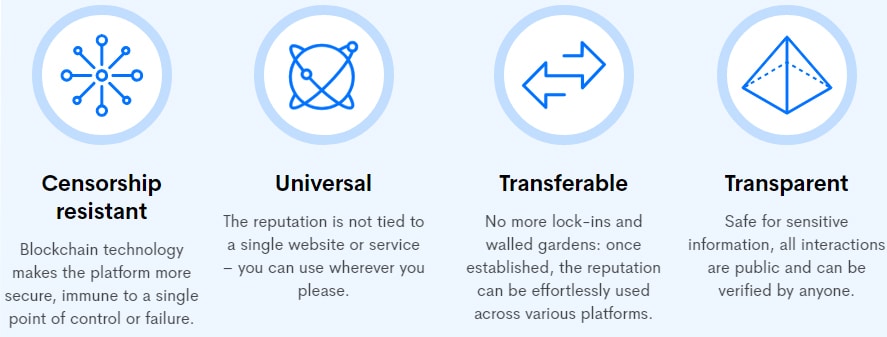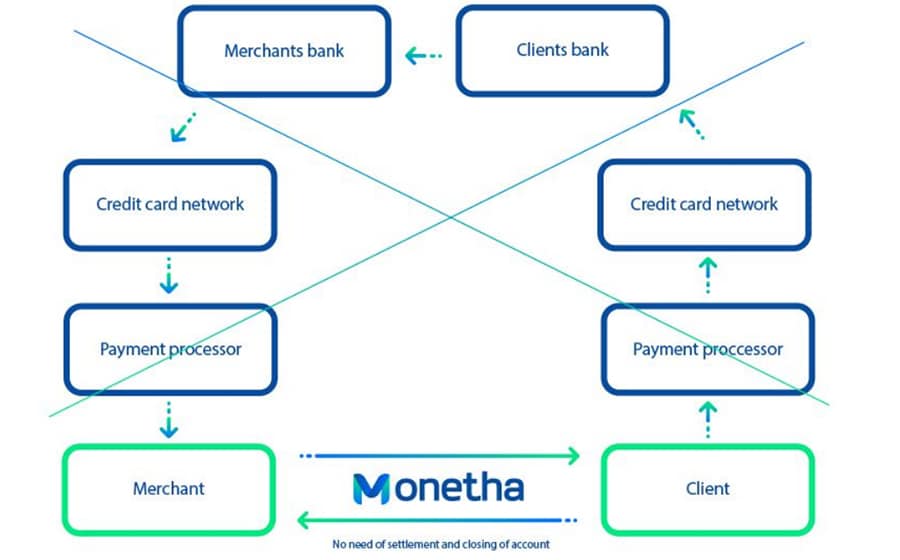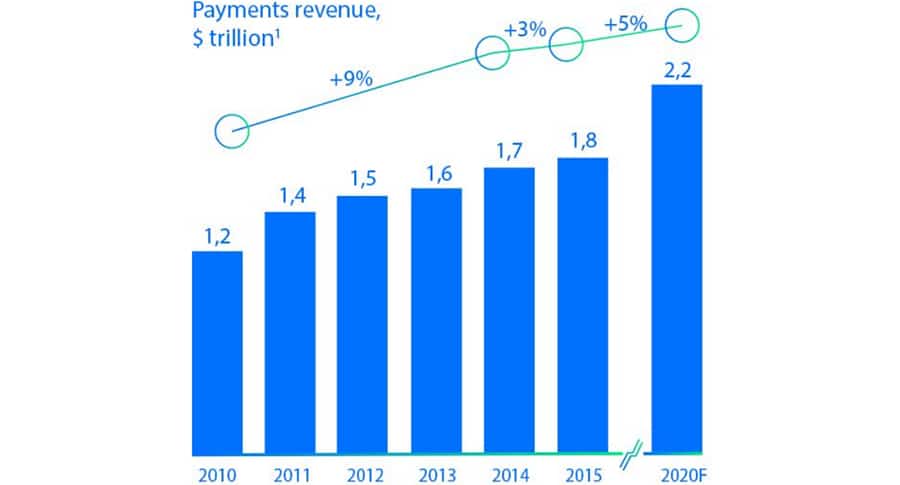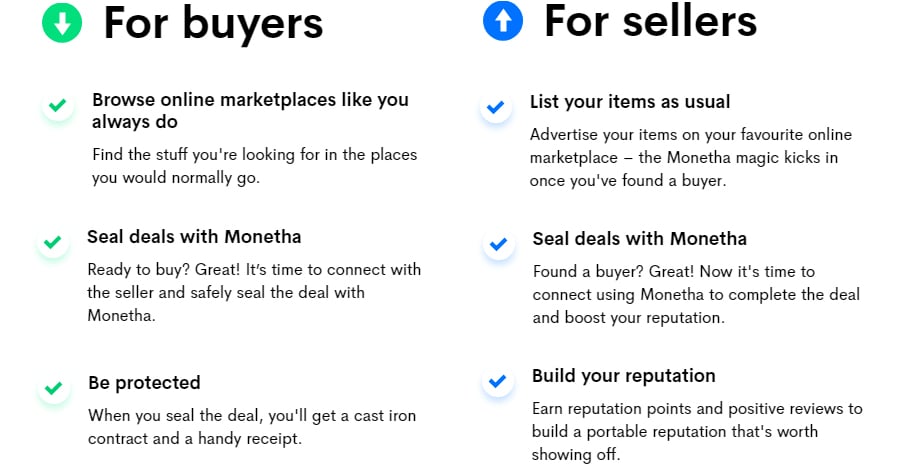E-commerce is arguably one of the largest growing sectors of the economy, and it is expected to continue to see continued explosive growth in the coming decade.
One blockchain platform looking to take advantage of that growth is Monetha, the decentralized reputation platform. They are trying to increase the overall level of confidence and probability of success for any transaction.
However, can Monetha really achieve these goals?
In this Monetha review, we will take an in-depth look into the project and its team members. We will also analyse the underlying technology, use cases and potential for large scale adoption of MTH tokens.
What is Monetha?
Monetha was created to help merchants and consumers by building a platform that reinforces trust and reputation, leading to an increase in the satisfaction and success of online ecommerce transactions. All of that is combined with a payment gateway, and its all built with smart contracts on the Ethereum network.
The first aim of the platform is to ensure real-time ecommerce transactions that remove third-party intervention. The second, and perhaps more important goal is to build a censorship resistant and transferable reputation that is reliable and based on user and merchant behaviors.
 Monetha Features. Image via Monetha Website
Monetha Features. Image via Monetha WebsiteThe core of Monetha’s technology is its Decentralized Trust and Reputation System (DTRS). Built with smart contracts, it creates a reliable relationship between merchants and customers. An algorithm built into the system verifies each transactions as it occurs, and assigns a trust rating.
That trust rating is used in the platform’s Trust Rating mechanism to create transparency. All of the ratings are publicly visible, immutable, and granted based on user and merchant behavior. The longer the system is used and the more users the more accurate the Trust Ratings become.
Weaknesses Monetha is Addressing
Current ecommerce models may be well established, but they also suffer from several weaknesses that need improvement. Most ecommerce suffers from the following weaknesses:
- High fees and commissions for third-parties;
- Lack of trust;
- Lack of transparency;
- Insecure platforms and transactions.
Monetha has addressed these issues by creating a decentralized blockchain platform that provides security, transparency and trust while nearly eliminating the third party fees that can cause ecommerce transactions to cost 10-15% or even 20% more than necessary.
Monetha Ecommerce Improvements
Monetha is more than just a payment gateway. It is looking to redefine the relationship between customer and merchant by solving the problems discussed above. Besides providing a superior payment solution, it’s also creating a platform that allows immutable trust and reputation to be built and carried to a number of external online ecommerce platforms.
 Monetha vs. The Status Quo. Via Monetha Whitepaper
Monetha vs. The Status Quo. Via Monetha WhitepaperJust consider the following benefits from the Monetha platform:
Improved Trust
Trust is the cornerstone of relationships, and that includes the relationship between buyers and sellers. When trust is present, transactions become easier and frictionless. Monetha’s Trust and Reputation system allows merchants to build a solid reputation based on their sales and service.
Best of all, because it is tied to sales there’s no need to worry about false or malicious reviews. And you can display the trust score with you to any platform that supports Monetha, which already includes Shopify, Facebook Marketplace, Craigslist and many others.
Increased Security
Smart contracts make each transaction secure, and gets rid of the need for third-party partnerships that can expose both buyers and sellers to unnecessary risks. When your transactions take place on the blockchain you no longer have to worry about security, getting paid, or a burden of proof in any aspect of a transaction. Smart contracts provide security that is superior to traditional contract law.
Lower Fees and Commissions
Smart contracts not only increase security, they also lower the fees and commissions associated with ecommerce transactions. One cost that disappears under the Monetha system is the costs of ensuring both parties stick to the contract, and the cost of taking action if that doesn’t happen.
 Money Makers cashing in...
Money Makers cashing in...Another cost that disappears is the multiple fees from third-party processors. Rather than 5%-20% in hidden fees, a Monetha transaction has a flat 1.5% transaction fee, and 0.5% of that is returned to Monetha stakeholders. There are also plans to introduce a 0.2% loyalty program for customers.
Faster Payment Processing
Traditional payment methods might mean it takes several days for a merchant to actually receive a payment into their bank account. With Monetha transactions are completed in 2 minutes. Improved cash flow helps strengthen the merchant business.
The Trust and Reputation System
The Monetha payment gateway is tied to the blockchain, meaning every transaction has data such as the sending and receiving wallet address, the time of the transaction, what was transferred, warranty information, delivery instructions and other data immutably saved to the blockchain. This makes it easy to review both merchants and customers, and to see the history of all such reviews, leading to a working Trust and Reputation System.
The ability to review and rate transactions is nothing new, but Monetha makes it more reliable by tying it to sales and putting all the information on the blockchain. They also add ratings for customers, which is a unique feature. This rating system allows merchants and customers to grow their profiles as they make more transactions.
Because everything is blockchain based security and anonymity are assured. And the system is global, executing on its own and without the direction of any centralized authority.
Merchants on the platform are rated only by verified buyers, and that rating is based on their service levels, such as how fast they ship, whether they honor all terms, and if the product is as described.
Customers also receive Trust Ratings on the Monetha platform based on the number and size of purchases, as well as their review history. Reviewing transactions increases the customer’s Trust Rating because it increases their value to the platform. The platform even makes it possible for merchants to refuse to sell to a customer if they feel their Trust Rating is too low.
The Monetha app is used to enter reviews and claims, and it stores all of this data on the blockchain. Customers are able to file a claim if they receive an item that is damaged, defective, or simply something they aren’t satisfied with and these claims will impact the merchant’s Trust Rating. This makes it crucial for merchants to deliver properly the first time, or to make amends quickly if there is a problem with an order.
So far the Trust Rating system has had positive reviews from both customers and merchants. Customers are able to find the most trustworthy merchants, and merchants can evaluate the credibility of their customers, something that hasn’t previously been possible. And as system usage increases the Monetha team has been able to fine tune the ratings to make them even more accurate and effective.
Monetha Team
The Monetha founders came together in early 2017 in order to solve the issues that are related to trust in global commerce. They decided later in the year that a decentralized ecosystem was required in order to achieve these levels of trust. This provided the impetus for them to launch the subsequent ICO.
Monetha is based in Lithuania and the three founders have diverse backgrounds. Andrej Ruckij previously was the CTO and co-founder of a company called Wowtto which was an outdoor digital advertising agency. He had been working at Adform as a the VP of strategic initiatives prior to founding Monetha.
 Monetha Founders
Monetha FoundersOne of his other co-founders is Justas Pikelis who has also founded a number of other start-ups including UFO Favours and Stebink. The final co-founder is Laurynas Jokubaitis who is also a founder of Wowtto and is a member of Forbes 30 under 30 for his work on blockchain technology and reputation systems.
Since completing the ICO, Monetha has been increasing the size of their team and they currently have 15 other employees who have experience in software development, customer support and marketing.
Monetha Strengths, Weaknesses and Concerns
Monetha is a unique solution to ecommerce problems, and as its influence grows it promises to be a disruptor in the space.
With Monetha Trust Ratings, customers will be able to make more rapid decisions regarding who they are willing to make purchases from, and they will know that their transactions are secure and protected. Traditional ecommerce platforms can’t promise the level of trust and transparency offered by Monetha.
The decentralized system they’ve developed has returned the power to the merchants and customers, and taken it out of the hands of the centralized third-party platforms that made ecommerce more expensive and less trustworthy.
 Benefits for Buyers and Sellers of Monetha
Benefits for Buyers and Sellers of MonethaThe system has also been devised to keep scammers at bay, making the ecosystem more trustworthy for merchants too.
The biggest challenge being faced by Monetha is the same as that faced by the blockchain ecosystem as a whole. Cryptocurrencies need to be demystified for the general public, and the association they have with criminal behavior needs to be removed.
The system isn’t without flaws. Because the Trust Rating system is applied to merchants it won’t cover the products individually. This could lead to product quality issues slipping through, but future improvements in the platform might include ratings for products.
And while they haven’t been found yet, there could be loopholes within the rating system that allows either merchants or customers to exploit the system. That said, as long as the Monetha team is quick to respond to any such loopholes the system should remain secure and resilient.
The MTH Token
Monetha conducted an ICO in August 2017, raising roughly $37 million through the sale of 200 million tokens at an average price of $0.19. In the months following the ICO the price of the token dropped to around $0.05. It rallied in December 2017 and reached an all-time high of $0.566 on January 11, 2018.
It moved steadily lower throughout 2018s bear market and dipped under $0.02 in September 2018. Since then it has recovered somewhat and as of November 13, 2018 is trading around $0.048, which is still quite a bit below its ICO price.
 Register at Binance and Buy MTH Tokens
Register at Binance and Buy MTH TokensAlmost all of the trading volume in MTH tokens is on the Binance Exchange, although it is available on a handful of other exchange platforms such as Mercatox, OKEx and KuCoin. It’s not possible to purchase MTH with fiat currencies, and all purchases must be made with BTC or ETH.
Because MTH is an Ethereum ERC-20 based token it can be stored in any ERC-20 compatible wallet.
Conclusion
Monetha began as a simple payment gateway going up against the likes of Paypal, but with the addition of a merchant and customer review system that can be ported to any ecommerce store it seems to be a stronger contender in the ecommerce space. By adding trust to online purchases it hopes to gain a portion of the over $1 trillion in global ecommerce.
While there are other blockchain platforms involved in payments and ecommerce, Monetha is unique in tackling trust and transparency within the ecommerce ecosystem. If they can successfully become the premier trust provider for ecommerce they stand to rise to become one of the strongest blockchain platforms.
The strength of the MTH currency remains questionable however, since it is only a utility token. Because it is only useful in the Monetha ecosystem it holds less value for investors, but if the development team finds a way to use it outside the Monetha ecosystem it could quickly explode in value.
Overall Monetha is a unique project that could be underappreciated and undervalued.
Disclaimer: These are the writer's opinions and should not be considered investment advice. Readers should do their own research.



